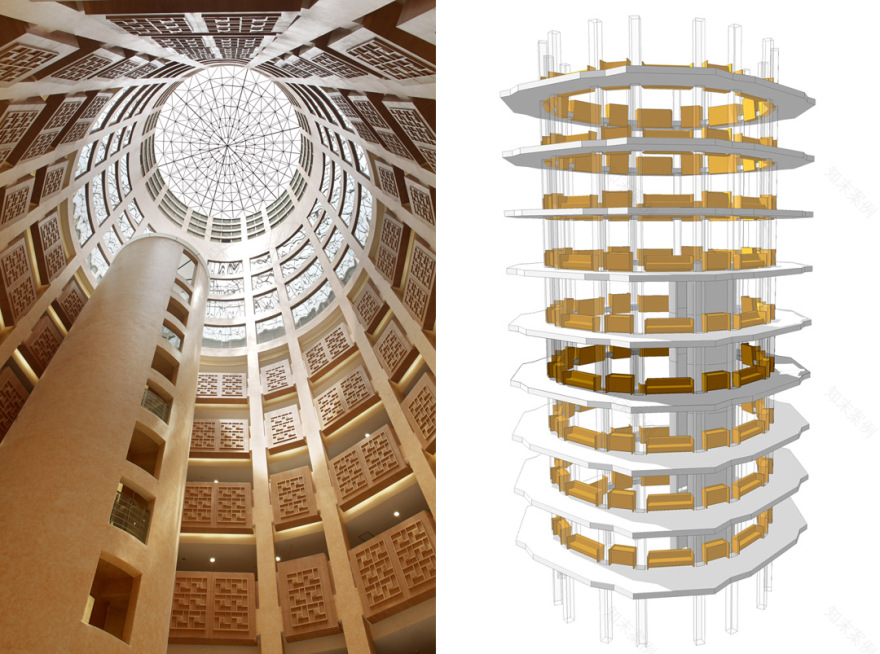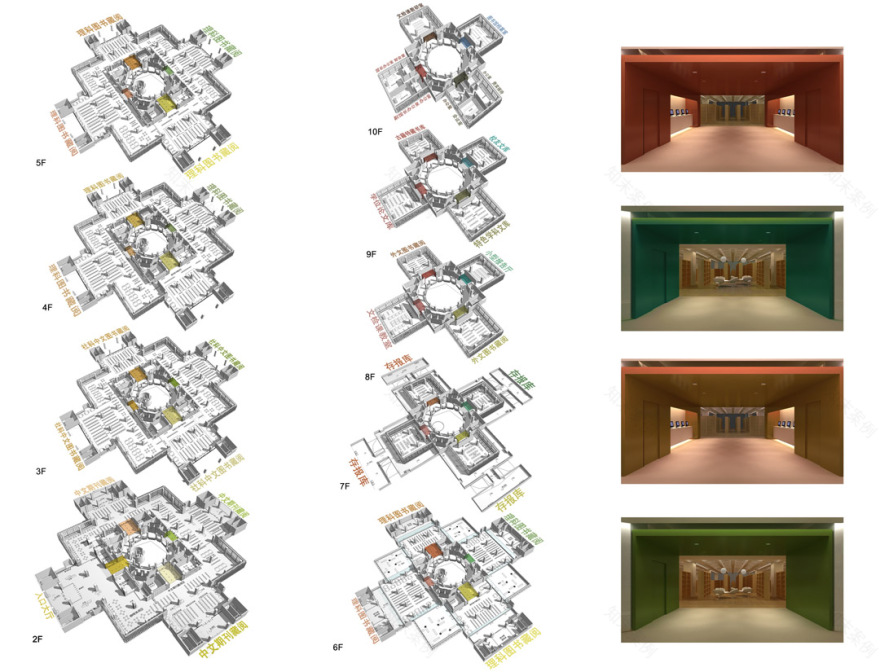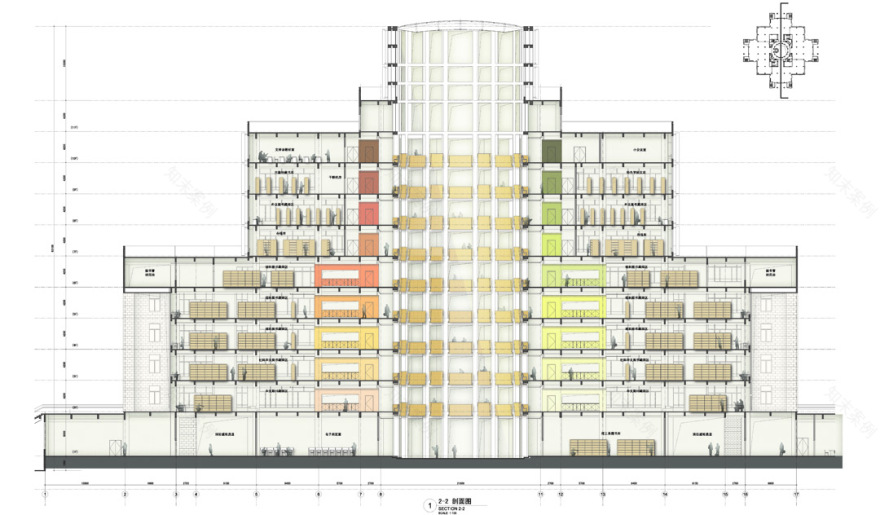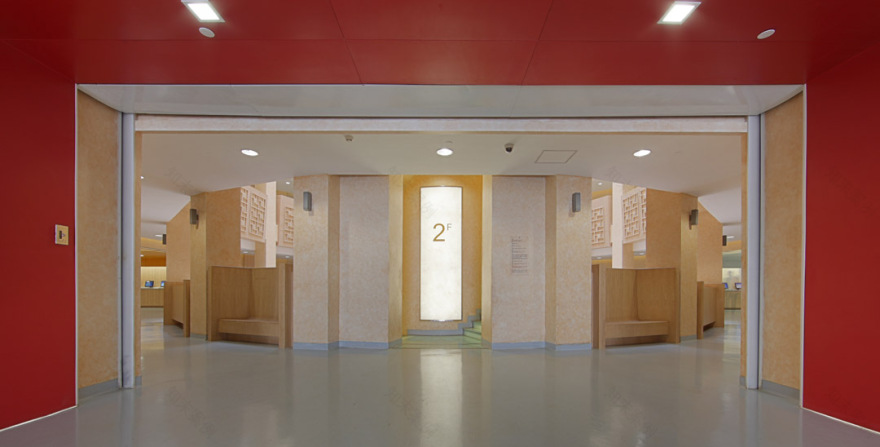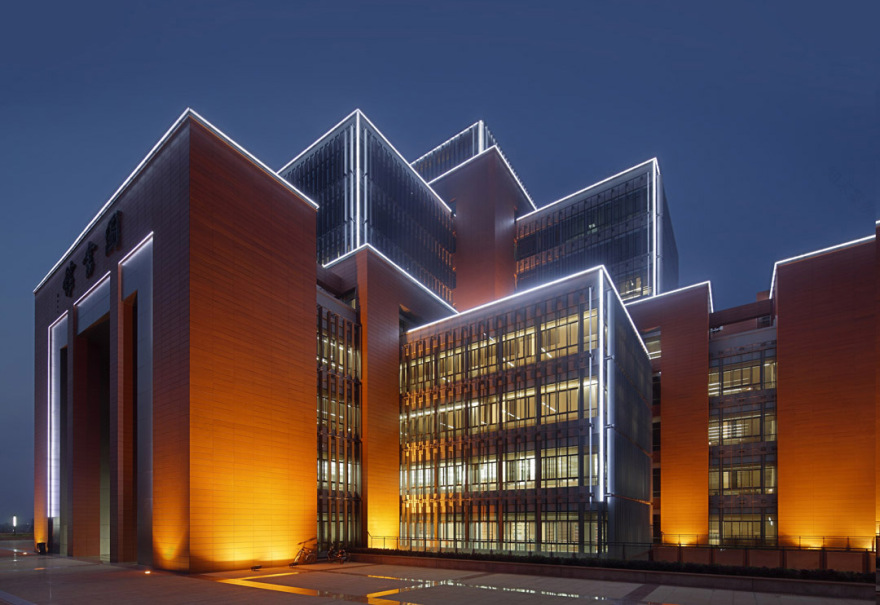查看完整案例


收藏

下载
非常感谢坛城设计
Appreciation towards STUDIO TWIST for providing the following description:
知识的分层空间昆明理工大学图书馆是昆明理工大学校园的标志性中心点。它位于呈贡校区总体规划南北和东西两条主轴线的交叉点上。
图书馆是一个基于双向对称轴组成的有清晰层次的建筑体,构成形式来源于昆明理工大学的校徽。它是一组十字型叠加的盒子,最高点位于对称轴中心。图书馆的各楼层被组织在这些盒子里。中心塔楼有一个圆形的天井作为主要中庭空间。它坐落在一个一层楼高的基座建筑上,通过楼梯到达基座上方位于二层楼的图书馆大厅层。基座建筑内有礼堂,教室和自习室,通过圆形中庭与图书馆主体建筑相连,同时也可通过有屋檐的走廊到达周边校区。
借鉴路易•康的理念,我们问了类似的问题:是什么构成了理想的大学图书馆?除了提供空间来阅读和学习,我们希望同时提供空间用来会面和交流。圆形中庭提供了一个理想的邂逅空间,使用者通过这个空间到达图书馆的不同区域。圆形中庭的玻璃穹顶为这个空间提供了充足的自然光线。
Ordered Spaces of Knowledge
This library is regarded as the symbolic center of the university campus. It is located at the intersection between the main North-South and East-West axes of the university master plan.
The library is a building of clear formal hierarchy with bi-axial symmetry based on the logo of the university, which is a group of stacked boxes in a cruciform plan with the tallest stack in the center. Library floors are organized within the boxes whilst the central tower has a rotunda atrium used as the main circulatory space. It sits on a one-storey tall plinth designed with steps rising to the main lobby floor of the library. The plinth building houses auditoriums, classrooms and self-study spaces on the ground level, and is connected to the library through the rotunda. It also serves as a sheltered thoroughfare to the surroundings.
Learning from Kahn, we asked a similar question: What constitutes the ideal University Library? Besides providing spaces to study, we wanted the library to provide spaces for meeting people and interaction. The rotunda provided an ideal space for chance meetings because visitors use it move between different sections of the library. It has a glass roof and is filled with natural light.
大学客户方要求我们对圆形中庭提出新的设计,原始中庭设计有一个钢筋混凝土的封闭式柱形螺旋楼梯。我们最初的方案是拆除单一功能的封闭式柱形楼梯空间,沿着圆形中庭的边缘建造一系列的开敞式环形楼梯,每层楼梯之间有一个突出的环形平台连接。这个宽敞的平台作为大家休息和会面的交流空间,同时可以在这里欣赏中庭楼梯空间内随意移动的人们的生动画面。遗憾的是,虽然客户非常认同和赞赏这个方案,由于工程造价问题,最终未能实施,而是保留了封闭式的柱形楼梯空间。
为了仍然满足圆形中庭作为交流和主要交通空间的功能,我们在环绕着每一层中庭空间的立柱之间设计了高靠背的座位和类似讲台的阅读桌 。高靠背的座椅面向走廊,使用者在这个半私密的空间阅读或交谈,同时可以沐浴中庭射入的自然光线。类似讲台的阅读桌则面向中庭,使阅读者面对着竖向贯通着10个楼层的中庭空间,就像在进行一场气势恢宏的演讲。这些家具设置,为图书馆的使用者提供了空间来停留、偶遇和交流。这个循环功能的空间因此成为了一个目的地,而不仅仅是一个单一功能的过渡空间。在细节表述方面,从一楼中庭空间到顶楼,我们将诗经中«荀子篇»的诗文按顺序雕刻在座椅和书桌上,象征着在知识之路的不断前进和求索。
The University asked us to rethink the current design of the rotunda atrium, which had enclosed a spiral staircase in a reinforced concrete column. Our initial design for the rotunda is to demolish the mono functional spiral stairs in a column, and replace it with a series of staircases along the round edge of each floor plate that link every 2 floors in a continuous spiral around the central atrium. This would have created balcony-like landings for resting and meeting, and visually enliven the rotunda space with the natural movement of visitors. Unfortunately, the final decision was to keep the closed spiral staircase because of cost considerations even though the open staircase scheme was more favorable.
In order to still fulfill the potential of the rotunda as a place for chance meetings, we designed tall-backed seats and lectern-like reading desks to be installed in between the columns on every floor surrounding the rotunda atrium. The tall-backed seats face inward to the corridor and provide partial sound privacy to the seat user whilst allowing natural light from the atrium to benefit reading or dialogue. The users of the lecterns face inwards to the center of the atrium, as if the user is giving a speech to an audience vertically organized along the 10 circular floors of the rotunda. These integrated furniture elements provide the library users spaces for pause, and facilitate spontaneous interactions or chance meetings between visitors. The circulatory space thus becomes a destination itself, rather than just being a transitional mono-functional space. As a symbolic narrative and a detail of the furniture, verses from the poem “Xunzi” are engraved in sequence onto the seats and lecterns from the lobby floor to the top floor to symbolize the upwards path towards knowledge.
在图书馆的每个楼层,中庭的环形走廊都设计有四个不同颜色的门,每个颜色代表着不同类别的图书区域,我们将颜色作为一种查找方式和书籍查找代码,同时它也成为建筑入口的一个部分。不同颜色的门道作为环形中庭到图书区的一个入口通道,并且在通道侧面墙体的深度设置了计算机站台,用于信息查询和书籍搜素。在使用者沿着环形中庭到达自己目的楼层时,可以看到各个楼层纵向排列渐变颜色的图书区入口画面。
在各个图书馆楼层,我们根据自然采光的位置关系来安排图书馆的不同功能区域,藏书区被安排在楼层靠里的位置,基本没有自然采光。阅读区则靠近楼层边缘,使读者可以享受自然光线和大学校区开阔的视野。
On every floor of the library, the circular corridors of the rotunda are punctured with 4 doorways, each of a different colour corresponding to the content on each floor. We wanted to use colour as a way finding or book finding code as well as applying it to the doorway as part of the architecture. The colour-coded doorways are deep enough to house computer stations for information and book searches, and act as a portal between the rotunda atrium and the book stacks. Visitors can see multiple gradated colour portals forming an internal elevation of the library building when they rise up the rotunda atrium to connect to their destination floor.
On each floor of the library, we simply organized the functions according to proximity to natural light. Book stacks are placed in the deepest part of the floor plan where there is no natural light. Reading areas are positioned along the periphery of the floor plans so as to allow readers to enjoy natural light and a panoramic distant view across the university campus.
在标准层,我们设计了一个延续的书架式墙体围绕着中庭的建筑体,形成中庭交通功能和服务功能与图书区相接的边缘,我们将这个书籍围绕的区域命名为“知识走廊”。木饰面展示书架凸出的横线条强调了方向感,间隔镂空的书架背板形成了休闲区的窗洞和门洞,加强了通风和采光。从这个走廊,使用者可以到达该层以内东南西北任何区域的藏书区,然后到达位于建筑边缘的阅读和自习区。越高的楼层,建筑面积根据建筑外形的退台叠级逐渐减少,通过圆形中庭走廊到达的只有藏书区。这个区域的空间独立性使得这个空间主要用来存放不对外开放的书籍和专业性参考书籍。
On typical levels, a continuous wall of bookshelves wrap around the box that houses the central atrium facilities. We name these ring of books “the corridor of knowledge”. The horizontality of the timber shelving is emphasized as a guide for circulation, and the shelves gradually open up to reveal pantry and break-out spaces at the corners allowing light and air to flow through. From this corridor the visitor can connect with the North South East or West wing to access the book stacks on the same floor before moving to the perimeter of the library building for reading and study. On higher levels of the library where the floor plan reduces in area, the North South East and West rooms are only accessible via the rotunda corridor. Their spatial autonomy is well-utilized to house closed stacks and specialist reference books.
通过对功能性空间的清晰划分,例如动态流通空间和停留、会面空间,自然光线充足的阅读空间和无自然采光的藏书空间,以及交谈空间和安静的学习空间,我们希望为学生们创造一个舒适的,有纪念意义的阅览和学习环境,同时与图书馆的建筑结构形式相对应。在这里莘莘学子们度过他们不可磨灭的青葱岁月。
Through clear spatial allocation of library functions such as dynamic circulation spaces and slow spaces for pause and chance meetings, natural light filled reading areas and book shelves areas without natural light, dialogue spaces and quiet study spaces, we hope to have created a comfortable and memorable library environment for the students that corresponds to the formal organization of the building.
项目名称 : 昆明理工大学图书馆
项目地点 : 云南省昆明市
建筑面积 : 27,000 平方米
设计范围 : 室内设计
项目期间 : 2009 – 2012
项目阶段 : 已建成
设计机构:STUDIO TWIST坛城设计
创作设计师:Lip Chiong
设计文字:Lip Chiong
摄影:STUDIO TWIST坛城设计
客户:昆明理工大学设计研究院
Project Name: Library for Kunming University of Science and Technology
Location: Kunming, Yunnan Province, China
Area: 27,000 sqm
Scope: Interior Design
Timeframe: 2009 – 2012
Status: Design Completed and Constructed
Design Agency: STUDIO TWIST
Creative Director: Lip Chiong
Text: Lip Chiong
Photographer: STUDIO TWIST
Client: Kunming University of Science and Technology
MORE:
坛城设计
STUDIO TWIST
,更多请至:
客服
消息
收藏
下载
最近




